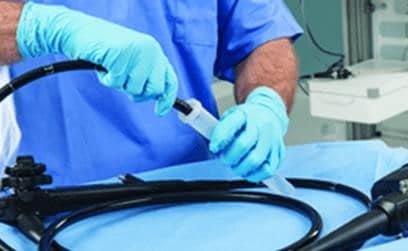 Hospitals continue to focus on duodenoscopes and their successful reprocessing in order to reduce the incidence of superbug breakouts related to endoscopes. The primary concern that hospitals have to address regarding duodenoscope reprocessing revolves around some of the manual components of disinfecting these devices.
Hospitals continue to focus on duodenoscopes and their successful reprocessing in order to reduce the incidence of superbug breakouts related to endoscopes. The primary concern that hospitals have to address regarding duodenoscope reprocessing revolves around some of the manual components of disinfecting these devices.
Bret T. Petersen, MD of the Mayo Clinic in Rochester, Minnesota recently spoke with Healio regarding some of the current updates around duodenoscope reprocessing, and endoscope reprocessing in general. Dr. Petersen pointed out that while endoscope-related outbreaks have declined over the past year, they are still a persistent risk for hospitals and ambulatory centers performing endoscopic procedures. Dr. Petersen also discussed some of the key updates on reprocessing best practices:
“Since 2015, much of our field has been focused on the need to attend to adequate endoscope reprocessing to avoid further outbreaks like those we’ve seen in multiple major centers from duodenoscopes,” Petersen told Healio Gastroenterology and Liver Disease. “The advice at the present time hasn’t changed greatly, in that we’re still emphasizing the importance of attending to pre-cleaning, cleaning, high-level disinfection, adequate drying and appropriate storage.”
Petersen said the manual components remain weak points in the process, as well as adequate drying after high-level disinfection. However, although outbreaks still occur, overall incidence has been in decline.
FDA oversight remains the most active current issue, Petersen said, with a focus on post-market surveillance studies. Two duodenoscope companies have completed their studies and are awaiting a compilation of all their data, and data from the third company should be ready by the end of the year.
“All of them are, unfortunately showing persistent levels of contamination,” Petersen said. “This brings to play the importance of single-use devices, including colonoscopes and duodenoscopes, which are very close to the marketplace.”
Read the entire article and view the accompanying video here: VIDEO: Focus remains on safe endoscope reprocessing
With all the protocols that endoscope techs and sterile processing staff must follow to properly high level disinfect every scope, hospitals and ambulatory centers must put in the proper checks and balances to make sure scopes are reprocessed properly every single time. While supervisors can spot check and catch a certain percentage of these errors, it’s not feasible to keep a pair of eyes on staff 24×7. This is where a scope tracking system, such as iRIScope from Mobile Aspects, can come into play. The system’s built in artificial intelligence analyzes all reprocessing steps in real-time to assess whether critical steps are missed. The system can then send immediate alerts to supervisors, and even display alerts on storage cabinets to warn end-users not to use any potentially poorly reprocessed endoscopes. While staff can be trained ad infinitum, all employees are prone to occasional mistakes. Help mitigate this risk with a smart tracking system like iRIScope and you could potentially save patients’ lives.
